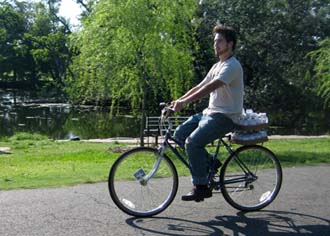Water, Water - It Isn't Everywhere
Tulane international social work students are raising public awareness about global health issues. This summer, four student-led groups picked a variety of issues to highlight including clean water, domestic violence and climate-change refugees.

Michael Smith, a student in the Tulane School of Social Work, rides a bike to a water distribution point in Audubon Park. To increase awareness, students distributed water bottles with student-made labels bearing “sobering facts about clean water issues.” (Photo by Karen Kosinski)
In the summer course, “Global Perspectives in Social Work Practice,” a group including Michael Smith and Karen Kosinski brought to Audubon Park free water bottles bearing some sobering facts about water scarcity. The group created the labels, each one presenting a startling statistic about global water issues.
Led by So'nia Gilkey, assistant professor of social work, students created public service announcements (PSAs) that are calling attention to issues of global concern throughout local, national and international communities.
One featured PSA is a one-minute video illustrating the challenges faced by children exposed to domestic violence. As the video rolls, photos of children are interspersed with facts about domestic violence and its impact on children around the world.
Student Brooke Wilson says most domestic violence programs are geared toward women and not the children who also suffer as victims of domestic violence because of the impact it has on their emotional and psychological well-being. Wilson took photos for the video during a trip to Belize to visit a domestic-violence shelter.
Now she hopes the video will raise funds for her fall visit to the same domestic violence shelter where she will arm children with coping skills.
“When I first thought 'PSA', I thought that given the new technology like Facebook and YouTube, I wanted to find a way to reach the largest amount of people in the shortest amount of time,” Wilson says. “I thought that if we could create something that captures emotion, then people could forward and forward and forward it. That way we could get the most exposure.”
Her Facebook cause, “Help Children of Domestic Violence in Belize,” has raised $100 so far and has more than 150 members.
Gilkey says creating PSAs not only encourages students to make a local/global connection to health and social problems but also teaches students to use their talents to be voices in a global world where change starts with the acknowledgement that change is needed.
Michelle Power's video tackled the difference between a refugee and an internally displaced person. Power, whose brother is an African refugee, says there are more than 35 million displaced people (refugees and internally displaced people) in the world.
Luke Entrop and Timothy van de Veken wrote a letter to the editor to The Times-Picayune calling for the United Nations to establish a protocol to aid people displaced by climate-related issues. By some estimates, as many as 200 million or two-thirds of the U.S. population have been or will be significantly affected by climate-related issues, according to the International Organization on Migration.
“We chose this topic because it is a global issue that has real implications for local citizens,” Entrop says. “There is a chance for New Orleans to be a global leader for climate refugees and internally displaced people due to climate change.”
Joseph Halm is marketing/communications coordinator for the Tulane School of Social Work.
